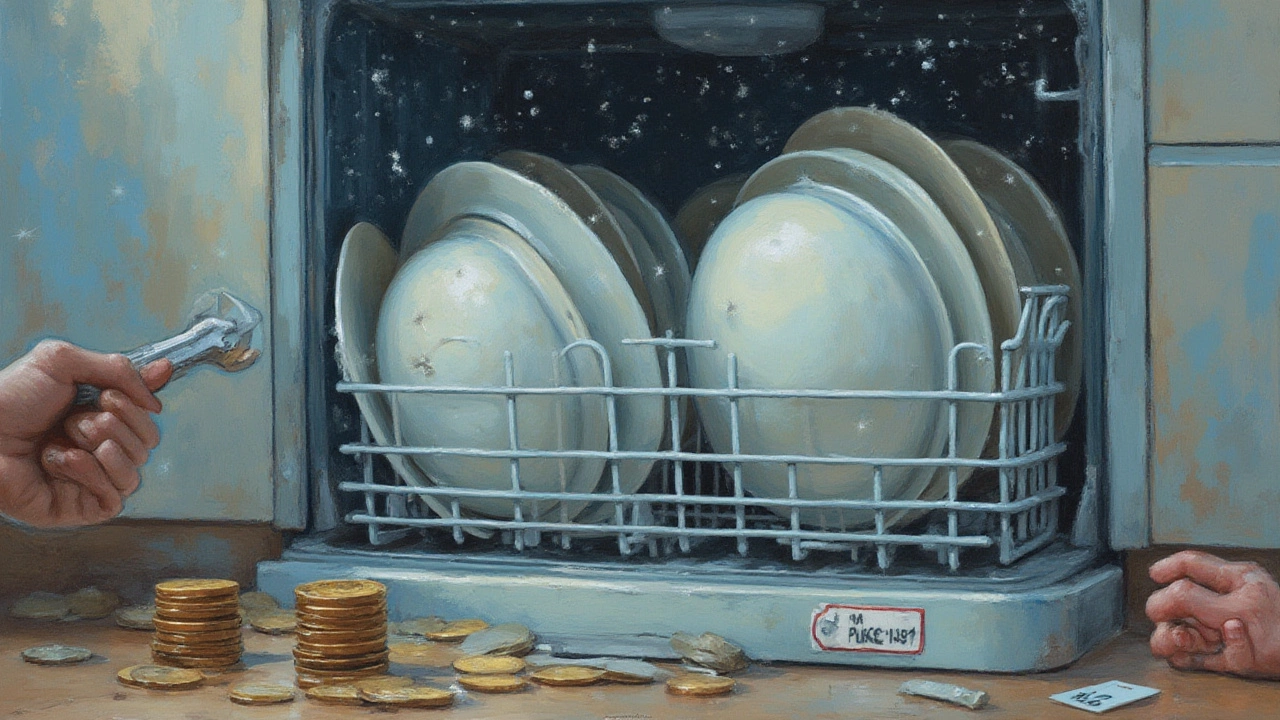Standing in the kitchen, staring down a moody dishwasher that’s just turned four years old, I can tell you the first thought that hits: is it time to fix this thing, or would I be better off ripping the bandage and buying a new one? My daughter Callista swears the dog, Muffin, broke it, but I’m pretty sure muffin’s only mistake was attempting to “help” with the rinse cycle by licking the plates. Still, when dishes start coming out streaky or the machine won’t even start, it’s a real dilemma. After all, four years isn’t ancient, but it isn’t brand new either. There’s a lot more to this decision than you might think, and making the right choice could save you hundreds.
Understanding Dishwasher Lifespan and Common Breakdowns
Let’s get realistic about dishwasher life expectancy. Most dishwashers are designed to last 8-12 years. According to the National Association of Home Builders, the average is right around 9 years for modern units. That means a 4-year-old dishwasher is technically around the halfway mark, like a car with 60,000 miles—lots of life left, but out of the "warranty baby" phase where everything’s easy. Now, machines aren’t all created equal. If you bought a rock-solid midrange Bosch or Whirlpool, odds are better for long haul success than the cheapest off-brand model. Still, even premium brands can have the odd breakdown—common issues include clogged spray arms, worn rubber seals, or an error-prone electronic control board that decides to throw a tantrum at the worst time.
I’ve found it’s usually either something minor—like a blocked drain filter, which takes ten minutes to clear—or something like a busted motor pump, which is trickier and costlier. For example, repairing the drain pump usually runs about £120-£200 (labor included), while replacing a heating element costs about £80-£150. If you just need new door seals for leaks, you’re looking at around £40-£70 and you can do it yourself with a YouTube video. The real trouble comes if you need a control board replacement; that’s the dishwasher’s brain, and it alone can set you back £180-£350 depending on the brand.
Table: Typical Dishwasher Part Lifespans & Replacement Costs (UK Average 2025):
| Component | Average Lifespan (Years) | Replacement Cost (£) |
|---|---|---|
| Drain pump | 6-8 | 120-200 |
| Heating element | 7-10 | 80-150 |
| Control board | 5-8 | 180-350 |
| Spray arm | 8-12 | 40-90 |
| Door seals | 6-10 | 40-70 |
I asked around and most repair engineers say the majority of dishwasher failures within four years are fixable and usually not terminal. In fact, Which? found that at four years old, fewer than 8% of dishwashers become completely uneconomical to repair.
When Repair Makes Sense: Cost, Warranty, and Value
Here’s where things get interesting: do you actually save by repairing a 4-year-old dishwasher, or are you throwing good money after bad? There's a simple rule pros use: if the fix costs less than half what you'd spend on a comparable new dishwasher, it's usually a yes. For reference, the average price for a mid-budget new dishwasher in July 2025 is about £400-£600. So, if a repair quote comes in at £180, it’s usually worth it, unless the machine's been slowly dying from day one.
Warranty matters a lot here. Most manufacturers give a 1-2 year full warranty, sometimes longer if you register the product or bought with a credit card offering extra protection. If your machine is ‘just’ out of warranty, check your paperwork or the manufacturer's website—some parts (like the motor) can have extended cover by brand. Don’t sleep on this: I’ve had friends get free control board swaps at 3.5 years just because they asked the manufacturer nicely. It pays to be polite and persistent.
Dishwashers are getting smarter every year. Newer models sport features like steam cleaning, Wi-Fi diagnostics, or ultra-silent cycles below 40 dB. If your 4-year-old machine doesn’t have those bells and whistles, you might not care, but it’s a factor if you’re all about energy savings or noise reduction. But here’s the rub: a well-maintained four-year-old dishwasher is usually 10-15% less water or energy efficient than the latest 2025 models, but that means only £15-£25 extra a year on utility bills. Unless you’re obsessed with eco-stats, minor difference.
- If you’re on a budget or hate shopping, fixing usually wins.
- If you’re planning a full kitchen remodel soon anyway, it might be time to upgrade.
- If the repair is minor (blocked spray arms, basic pump), fix it—most technicians sort it in an hour.
- If repair involves multiple failures (pump, element, board), start thinking about replacement.
I know a guy who replaced a £30 door seal himself in an afternoon, felt like a superhero, and got another five years out of a “failing” Bosch dishwasher. You don’t need engineering skills for most repairs, just a willingness to give it a go—and YouTube. But if opening up appliances makes you sweat, call in a pro and get a written estimate before they start.

Signs You Should Replace, Not Repair
Much as I love saving a penny, sometimes you’ve got to let go. Here’s the cold, hard truth: some problems are a sign your dishwasher is headed for the big kitchen in the sky. If your 4-year-old machine does any of the following, replacement makes much more sense:
- The inside tub is rusting through or physically damaged. No fix is safe or cost-effective for that.
- Leaks mysteriously persist even after new seals and hoses.
- Electronic board faults are recurring, despite new parts.
- It’s harassing you with new error codes every month, or cycles now take 2+ hours for a “quick wash.”
- Parts are impossible to find, or only available at crazy prices online.
One sneaky tip: check the availability and cost of replacement parts before deciding. I once almost paid £220 to fix a 4-year-old cheapo dishwasher, then found out online that the same model had discontinued main boards. Not only was the repair going to take weeks, but the part came with zero guarantee. The repairman kindly talked me out of it (bless him), and I opted for a reliable replacement instead. If your brand is still popular and parts flood eBay and Amazon, you’re in a much better spot.
Another “aha!” moment—energy bills. If your current dishwasher is loud as a jackhammer or takes forever, new models offer massive improvements. Data from Which? in 2025 shows modern dishwashers now use 40% less water and 25% less electricity than units just five years ago. Swapping to a new one could save you £30-£45 annually. Factor in ongoing repairs and the “energy penalty,” and replacement starts looking sensible if you’ve got a lemon.
For renters, or anyone who moves often, fixing is almost always better—unless your landlord picks up the tab. For homeowners planning a kitchen upgrade or resale, buyers do notice beautiful, nearly-new appliances. It’s a small, sneaky way to make your home stand out without breaking the bank.
Tips to Keep Your Dishwasher Running Longer (And Save on Repairs)
Assuming you lean toward repairing, there are easy things any busy parent or pet owner (Muffin, looking at you) can do to buy months, even years of reliable service. People often overlook the basics, and simple habits can make a huge difference in dishwasher health:
- Clear plates: Even if your machine says “no pre-rinse needed,” knock chunky bits (bones, rice, dog hair, whatever) into the bin. Blocked filters are the #1 cause of minor breakdowns.
- Clean the filter monthly: Most dishwashers have a filter basket that twists out. Hot soapy water, old toothbrush, two minutes—done. Do this once a month and avoid expensive callouts for clogs.
- Run a cleaning cycle: Every few weeks, chuck a cup of white vinegar or a branded dishwasher cleaner into the bottom and run a hot cycle. This nukes limescale and hidden grime.
- Inspect seals and spray arms: Check the rubber door seal for grime build-up and wipe it every couple of weeks. Pull out the spray arms and poke out any clogged holes with a toothpick or cocktail stick.
- Don’t overload: Cramming in too many dishes kills wash performance, and stresses the motor.
- Update your detergent: Older or cheaper tablets aren’t always kind to modern dishwashers. Try switching brands if you’re seeing streaks or cloudy glassware.
- Fix small problems fast: Hear grinding sounds or smell something funky? Don’t wait—sort it now, before it becomes a pricey repair job.
Another overlooked tip: Check your water hardness. Hard water creates limescale, which shortens the life of heating elements and barrels. If you’re in a limescale-prone area, run a descaler every few months. Some people install a water softener—pricey but worth it long-term if you keep burning through appliances.
Finally, if you ever do replace your dishwasher, recycle the old one through proper channels. Most UK councils and appliance retailers offer collection and safe dismantling. It’s a kindness to the planet, and honestly, a lot easier than trying to turn the old unit into a planter (yeah, learned that the hard way).
So is dishwasher repair worth it at the four-year mark? Most of the time, yes—especially if the problem is straightforward and you like your current machine. A little DIY maintenance stretches its life and saves real cash. But if the breakdown is major or constant, or you spot rust, leaks, or dead electronics, don’t throw good money after bad. Just don’t forget to let the dog know—some heroes aren’t meant for dish duty.




